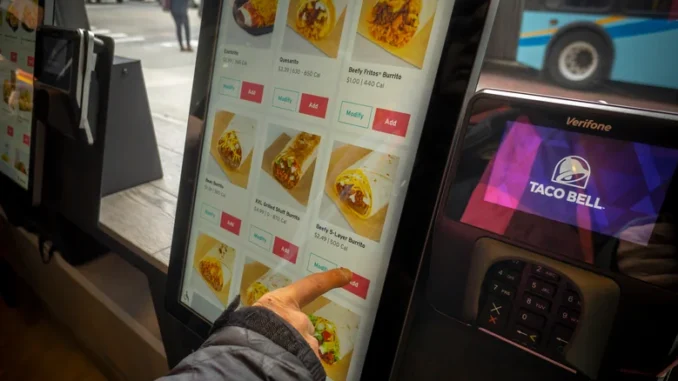
By Lea Mira, RTN staff writer - 4.4.2024
Yum Brands, the parent company of Taco Bell, Pizza Hut, KFC, and Habit Burger Grill, is pioneering an “AI-powered” future for its fast-food operations under the leadership of Joe Park, the Chief Digital and Technology Officer. With a large portion of its sales now digital, Yum is doubling down on technology and automation to enhance every aspect of its restaurant operations.
Park assumed his new position in March, taking over from Clay Johnson, who transitioned to an advisory role within the company. Bringing a wealth of experience in technology and innovation, Park first joined Yum Brands in 2020, serving as the company’s inaugural Chief Innovation Officer. In this role, he spearheaded the development of emerging technologies aimed at enhancing kitchen operations through artificial intelligence (AI) and automation. His efforts have been central to Yum Brands’ strategy to streamline processes and improve efficiency across its global network of restaurants.

In 2021, Park’s role expanded as he was appointed Chief Digital and Technology Officer at Pizza Hut Global. Here, he was responsible for overseeing the technology infrastructure and customer experience strategies for over 19,000 Pizza Hut locations across more than 100 countries. Under his leadership, Pizza Hut has embraced digital innovation, leveraging technology to better serve its customers and stay competitive in the fast-food industry.
The company’s digital sales have seen a substantial increase, now accounting for about 45% of its total sales, a figure that has doubled since 2019. This shift towards digital is part of a broader industry trend where fast-food chains are investing more in technology in response to the challenges posed by higher labor costs and inflation. The adoption of digital ordering systems and the expansion of drive-through capabilities have been accelerated by the pandemic, with AI now seen as a key driver for future sales growth and cost reduction.
Park has a background in digital innovation from his time at Walmart, envisions a future where AI permeates every facet of the restaurant experience. This includes the use of generative AI technologies, like those behind ChatGPT, to empower franchisees and streamline operations. One of the tools under development is the SuperApp, a mobile application designed to act as a comprehensive management tool for restaurant managers, offering features from operational advice to inventory and shift scheduling within a single platform.
The SuperApp, already in use at over 8,700 Pizza Hut and KFC locations, represents a big step towards integrating technology into the day-to-day management of restaurants. It includes innovative features such as augmented reality for training employees on new products. The development and deployment of such technologies are partly funded by tech fees from franchise owners, although the specific amounts charged are not disclosed.
Yum is also exploring customer-facing AI applications, including voice AI for drive-through orders and image-recognition AI to optimize drive-through service. Despite the potential for technology to displace human workers, Yum maintains that its employees remain crucial to its operations, with technology serving to enhance their work experience rather than replace it.
The company’s approach to AI extends to customer interactions, with a focus on personalization and efficiency rather than dynamic pricing strategies that have sparked backlash in the industry. By leveraging data across its brands, Yum aims to create comprehensive customer profiles to drive loyalty and increase sales.

The company’s strategic deployment of its ecommerce platform across its major brands, including KFC and Taco Bell in the U.S., with plans to extend to Pizza Hut U.S. and international markets, further underscores its commitment to digital transformation. The introduction of self-service kiosks across 500 KFC locations in the U.S., along with implementations at Taco Bell and The Habit, highlights Yum’s strategy to enhance customer experience and operational efficiency. These kiosks not only facilitate streamlined operations but also contribute to increased sales through higher ticket averages.
Yum’s proprietary point-of-sale system, Poseidon, has been successfully rolled out to 1,700 Taco Bell locations, demonstrating the company’s dedication to modernizing its transactional infrastructure. Additionally, the expansion of Dragontail, an AI-driven kitchen management system, to over 4,000 locations with plans for nearly 6,000 more, reflects Yum’s ambition to optimize order sequencing for improved freshness and accuracy.
The deployment of an AI inventory management system across the majority of KFC U.S. and Taco Bell restaurants marks a significant advancement in streamlining inventory processes. This system, set to expand to over 3,000 additional restaurants in 2024, exemplifies Yum’s pursuit of operational excellence and accuracy in inventory management.
Yum Brands’ aggressive technology strategy, encompassing ecommerce platforms, kiosks, advanced point-of-sale systems, AI-driven management tools, and a comprehensive manager’s app, positions the company as a leader in the fast-food industry’s technological evolution. By equipping its franchisees with cutting-edge tools and systems, Yum aims to differentiate its brands in both established and emerging markets, ensuring a competitive advantage in the global fast-food landscape.
This strategic shift is poised to redefine the fast-food experience, leveraging AI to enhance operational efficiency, kitchen productivity, and customer engagement.
Optimizing Operations with AI
The SuperApp platform is designed to streamline critical operational tasks such as scheduling, ordering, and ingredient forecasting. By automating these processes, Yum Brands aims to liberate staff from the back office, enabling them to focus more on delivering superior customer service. This initiative reflects a broader trend in the industry towards adopting digital tools to improve efficiency and reduce overhead.
Revolutionizing Kitchen Dynamics
Beyond operational management, Yum Brands is keen on revolutionizing how food is prepared in its kitchens. The company is investing in automation technologies that promise to optimize cooking processes, potentially predicting peak hours to prepare food in advance. Such innovations could significantly reduce wait times for customers and minimize food waste, aligning with sustainability goals while enhancing the dining experience.
Personalizing Customer Interactions
The influence of AI extends to how Yum Brands interacts with its customers. By harnessing the power of customer data, the company plans to offer personalized promotions and recommendations through its mobile apps. This level of customization could lead to more targeted marketing, offering customers deals and suggestions based on their preferences and dining habits. This strategy not only aims to increase customer satisfaction but also to drive sales during off-peak times.
While the notion of robots taking orders at Taco Bell and Pizza Hut might still be a distant reality, the integration of AI into various aspects of the fast-food experience is undeniably underway. Yum Brands’ commitment to leveraging AI across its operations signals a future where technology and human service coalesce to create a more efficient, personalized, and engaging fast-food experience. As these initiatives unfold, Taco Bell and Pizza Hut could set new standards for innovation in the fast-food industry.

